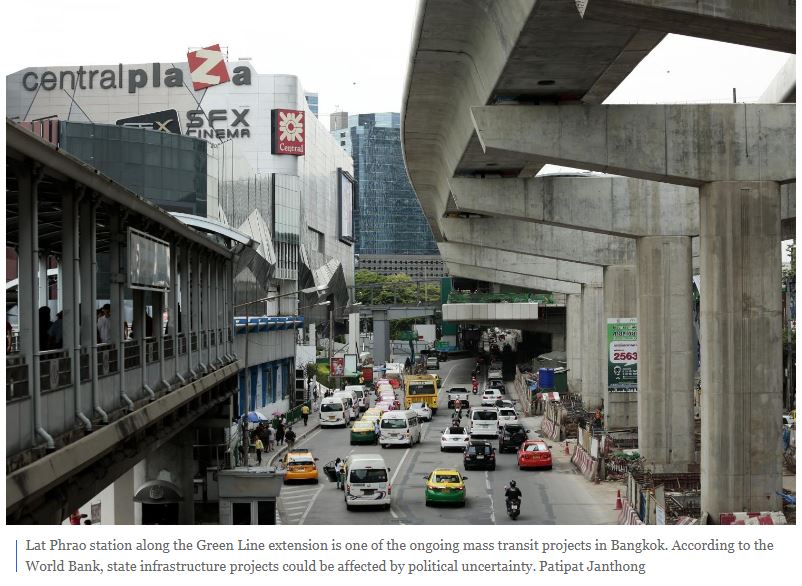Thailand: World Bank cites risks to outlook
Political uncertainty is a major risk sapping investor and consumer confidence and clouding the country’s economic outlook, the World Bank says.
Domestic factors are the main risk to Thailand’s outlook for the rest of the year, said Kiatipong Ariyapruchya, the global lender’s senior economist for Thailand.
Delays in the new government’s formation will postpone fiscal 2020 budget disbursement for three months from the start of the fiscal year in Oct 1 and could defer state investment in infrastructure megaprojects and affect public expenditure over the next few years, Mr Kiatipong said.
“Even though the new government can be established, it might not be able to stay in power for a long time, given the cohesiveness of the newly established 19-party coalition government,” he said. “So it’s a key risk factor for the Thai economic outlook.”
The lingering trade tension between the US and China could further weaken demand for Thai exports and dampen private investment in export-oriented industries.
With headwinds from both internal and external factors, the World Bank earlier slashed the GDP forecast for this year to 3.5% from an earlier 3.8%. It has cut export growth of goods and services for 2019 from 5.7% to 2.2%.
The World Bank projects private consumption growth at 4.6% and government consumption growth at 4.9%, Mr Kiatipong said.
Thailand’s economy expanded 2.8% from a year earlier in the three months through March, the first time it grew below 3% since mid-2015.
Merchandise shipments contracted by 4%, marking the first quarterly contraction in three years, mainly due to flagging global and regional economic growth hit by unresolved trade disputes and increased protectionism.
Public investment declined slightly over the past two quarters as implementation of megaprojects was delayed, while private investment in the first quarter remained close to its three-year high.
Mr Kiatipong said domestic investment would be the main contributor to economic growth in the second half, driven by the ongoing infrastructure megaproject investment process, but the engine would lose some momentum over the next few years resulting from the lengthy government formation.
Brigit Hansl, the World Bank’s country manager for Thailand, said the Bank of Thailand’s Monetary Policy Committee is expected to maintain its policy rate at 1.75% because of the slower pace of economic expansion and subdued inflation.
Headline inflation is estimated to stay near the low end of the 1-4% target range and if this is the case, monetary policy and fiscal buffers are expected to remain adequate to address further macroeconomic shocks.
“Slower pace of growth of the Thai economy is in line with other economies worldwide. With Thailand’s strong economic fundamentals, we don’t see a reason for a policy rate manoeuvre,” she said.
The World Bank predicts the baht will see an upward bias against the greenback, given that infrastructure megaproject investment and a sizeable current account surplus would further attract both short-term offshore funds to flow into the Thai equity and bond markets, and foreign direct investment.
“We believe the time is ripe for fiscal policy to once again lift domestic demand,” Noelan Arbis, an economist at HSBC, said in a research note.
But fiscal support this time should be different from the past, he said. Previous fiscal measures focused on raising private consumption through a build-up of household debt, which has now risen to 80% of GDP. Moreover, the Bank of Thailand has less ammunition to ease compared to previous cycles.
A balanced approach to raising domestic demand without raising household debt is thus needed for a sustainable boost to growth.
Mr Arbis believes measures such as a minimum wage hike, debt forgiveness programmes, tax cuts and welfare transfer schemes would help raise private consumption while easing the consumer debt burden.
“Fortunately, the ruling coalition, led by the Palang Pracharath Party, broadly agrees on the need to use fiscal policy to boost growth and has introduced similar measures,” he said. “Timely implementation of these policies, however, is needed to offset external headwinds and the delay in implementing the fiscal 2020 budget.”
Source: https://www.bangkokpost.com/business/1709187/world-bank-cites-risks-to-outlook


 English
English




